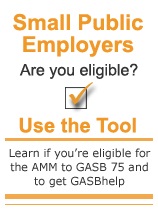Standards
For public employers, generally accepted accounting principles (GAAP) are primarily established by the statements issued by the Governmental Accounting Standards Board (GASB). GASB statements are accounting standards used to prepare, present, and report the financial information of public employers.

GASB 75 — Revealing the cost of nonpension retirement benefits
Because of the growing concern over the potential magnitude of government employer obligations for payout of future retiree health care benefits, GASB issued Statements 74 and 75 for reporting the costs and liabilities associated with health and other nonpension benefits for retired public employees. Collectively, these benefits are called Other Post-Employment Benefits (OPEB).
Under these standards, the liability must be determined for OPEBs paid in the current year and those promised for future years. That is, OPEBs are viewed as a form of deferred compensation, similar to pension liabilities, and public employers can no longer report only the annual cash outlay for current retirees, but rather the accrued current and future promised benefits.
By reporting OPEBs, nonpension postemployment benefits are revealed as accruable costs (liabilities) on public employer financial statements. GASB 75 does not require prefunding of these liabilities. GASB 75 reveals complete, reliable, decision-useful financial information to foster improved accountability and a better foundation for informed policy decisions about, for example, the level and types of benefits provided and potential methods of financing those benefits.
FAQs
What is GASB?
What does GASB 75 require employers to disclose on their financial statements?
What are potential consequences of not following GASB 75?
Links


